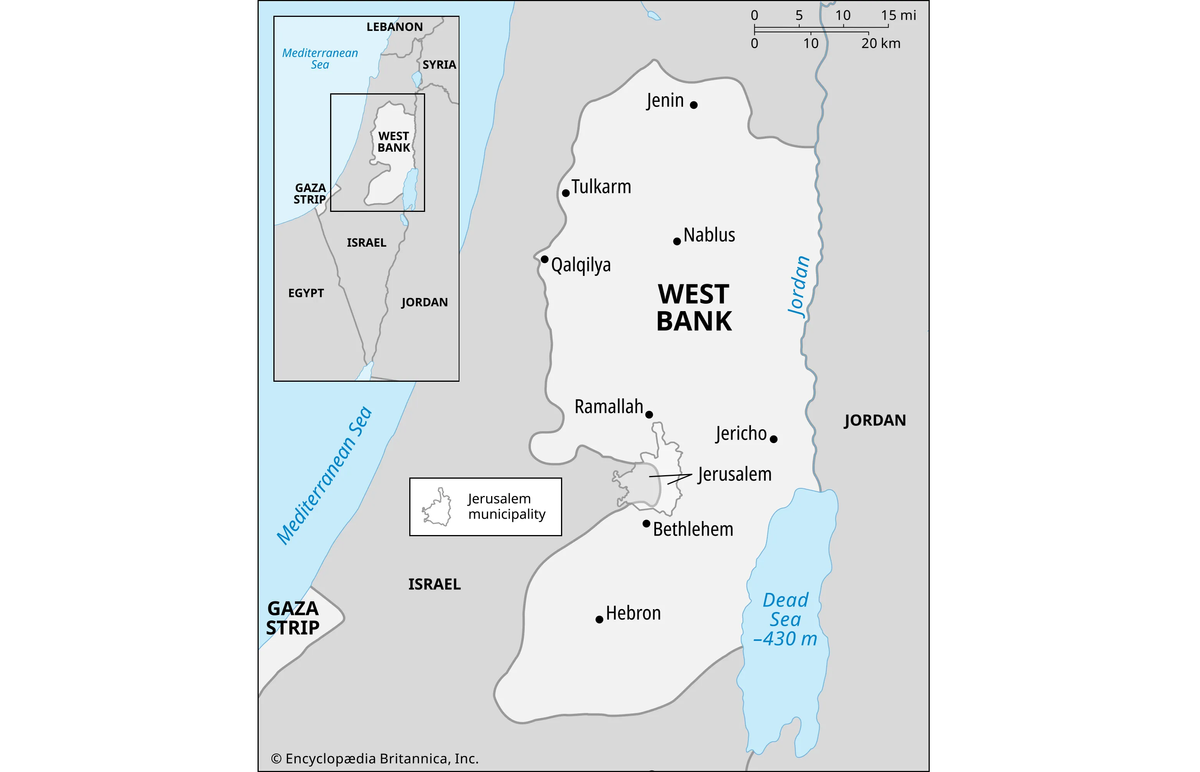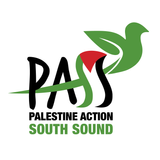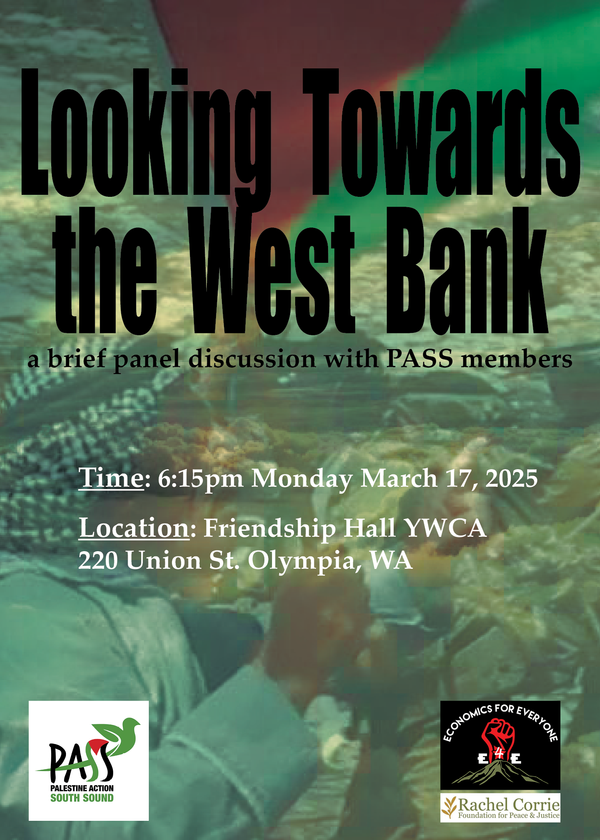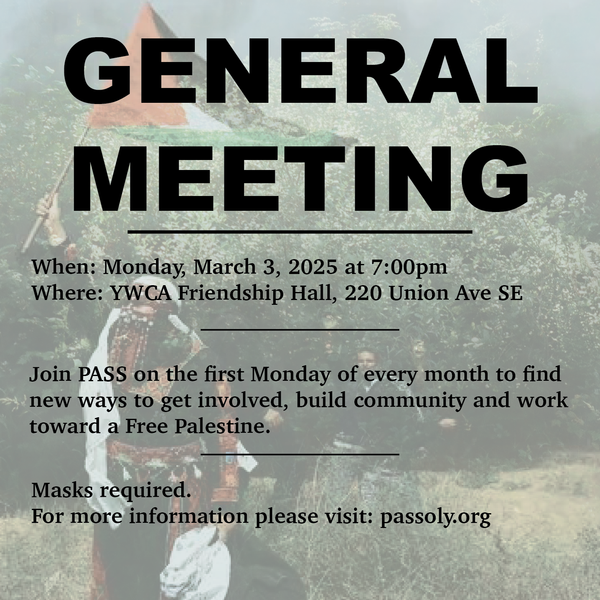Report Back from Looking Towards the West Bank

On March 17, the Palestine Action of the South Sound (PASS) Education and Outreach Committee hosted Looking Towards the West Bank, a public talk by Craig Corrie and Antonio exploring the expanding Israeli military operations in the West Bank. With so much attention focused on Gaza since October 2023, the West Bank is often overlooked.
The panel opened with a call for the immediate release of the detained Columbia University Graduate Student, Mahmoud Khalili, who was arrested without cause in an act of state repression for his affiliation with Columbia’s Gaza Solidarity Encampment. This was followed by a moment of silence for Rachel Corrie and Aysenur Ezgi Eygi, who were both killed by the Israeli military. The panel took place 22 years and 1 day after Rachel Corrie’s death.
The genocide in Gaza has been uniquely destructive and also served as a smokescreen for Israel’s increasingly eliminationist military operations in the West Bank. Israel’s aim of ethnically cleansing the remainder of Palestine, fracturing resistance movements, and extending its border to encompass all of historic Palestine come into focus in the West Bank. Widening our scope to include a comprehensive analysis of Israel is necessary for adequately supporting a free Palestine.
Unable to destroy resistance movements in the field, the [Palestine Authority] resorts to co-optation strategies including what they call a ‘surrender program.’
Antonio’s presentation primarily focused on the West Bank’s resistance efforts and the Israeli military’s efforts to crush them. Since October 2023, Israeli violence in the West Bank has accelerated along with the drastic increase of deadly airstrikes. Airstrikes were common during the Second Intifada, which lasted from 2000 to 2005, but haven’t been as prevalent since then. Between 2005 and October 2023, Israeli airstrikes killed 14 people in the West Bank. Since October 2023 however, Israeli warplanes have committed over 60 deadly airstrikes killing over 250 people.
The West Bank, unlike Gaza, is under the governance of the Palestine Authority (PA). Founded 1994, the PA has acted as ‘managers’ for Israel’s police state in the West Bank. Unable to destroy resistance movements in the field, the PA resorts to co-optation strategies including what they call a ‘surrender program.’ The surrender program includes the PA offering everything from stipends to employment opportunities in exchange for militants laying down their arms. Ultimately, the PA failed to stop the spread of militant resistance and thus failed to prevent Israel’s current Gaza-fication of the West Bank. Despite the carnage, resistance movements in the West Bank persist. Jenin is the West Bank’s epicenter of anticolonial revolt. Jenin’s intergenerational legacy of social and cultural resistance has been emulated across the West Bank in places like Nablus and Tulkarem.
Craig Corrie discussed the conditions of everyday life in the West Bank which he witnessed during his visits. Israel has intentionally built roads, walls, and checkpoints to sever the West Bank into a disconnected landscape ripe for colonial domination. As he saw, the Israeli strategy is to totally dispossess Palestinians of their land and everything on it. “Palestinians are not allowed to own the water that falls on their roofs.”
“The Palestinian will to resist is as visceral as it is political.”
Craig went on to describe the stark contrast between Israeli and Palestinian architecture. The former mimics Western architectural norms for single family living while the latter mirrors social structures built through generations of family ties. Craig explained that it was easy to tell which houses are Palestinian because they always have rebar sticking out of the top. Craig noticed that many of the Palestinian homes appeared to be unfinished; he later learned that this was intentional. The next generation in each family adds their own floor to the home, creating a multigenerational housing structure. Palestine is more than a territory for its occupants. It is the result of generations of irreplaceable social and architectural infrastructure that symbiotically produce a home that cannot be picked up and moved across the Jordan River. “The Palestinian will to resist is as visceral as it is political.”
76 years after the Nakba, the international community still underestimates the attachment Palestinians have to their land, whether that is in Gaza or the West Bank. Trump and Netanyahu can call for displacement all they want, but the reality is it will never go unchallenged. Craig pointed out that the olive trees that are planted in Palestine have been producing olives for many generations. When Israelis prevent access to the trees or chop them down, they are severing family ties. Palestinians will continue to relentlessly struggle against Israel’s US-backed occupying army because there is only one Palestine. For the people of Palestine, the will to resist transcends death. Justice is the only option.
While the talk was wrapping up, Israel ended its ceasefire agreement by resuming its bombing of Gaza killing over 400 people and wounding at least another 500. Days later, the Israeli military issued demolition orders for an additional 60 Palestinian homes in the Jenin refugee camp. Events like these highlight why it is important to maintain vigilance and solidarity with the besieged people of the West Bank, Gaza, and all occupied Palestinian lands.



